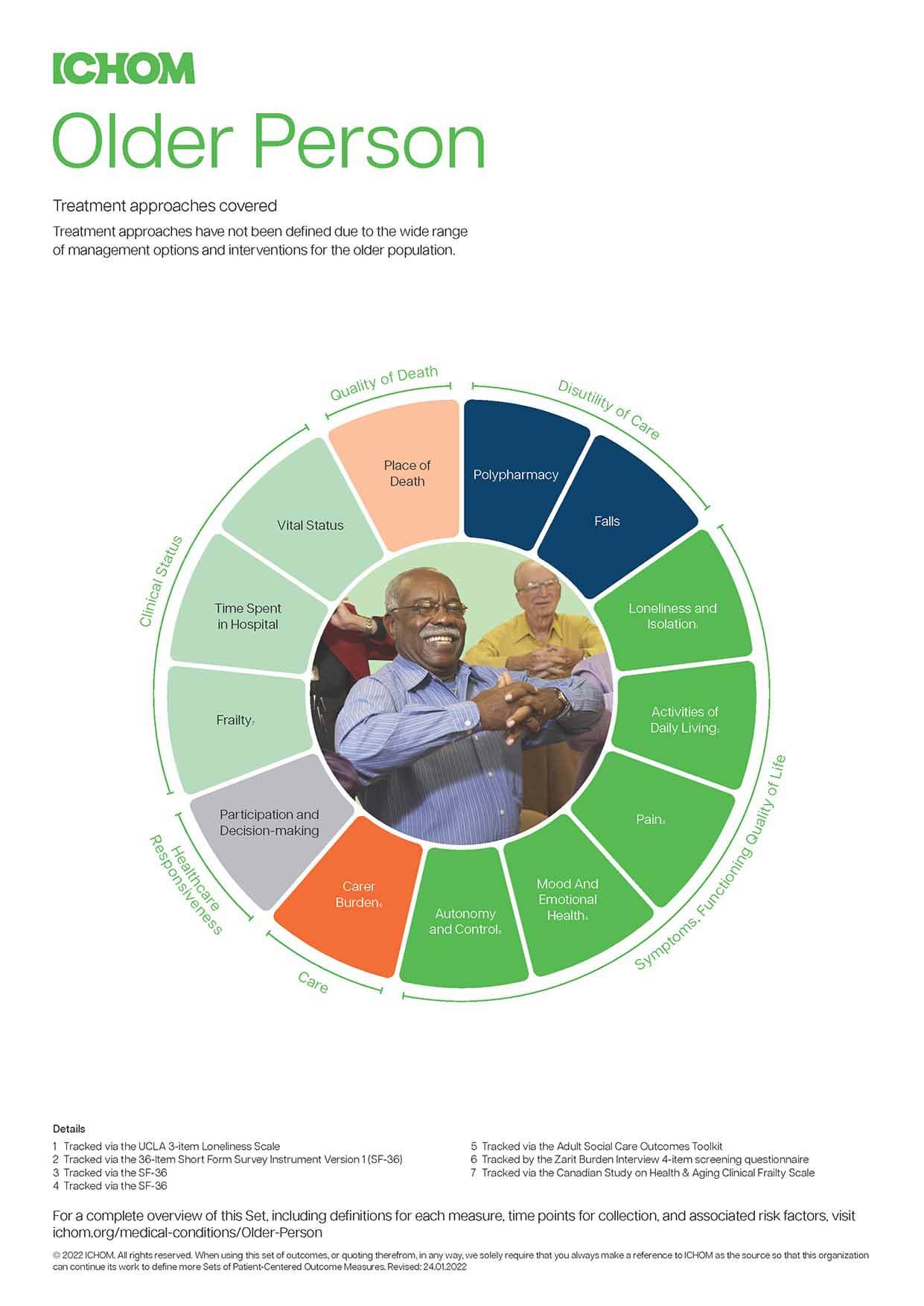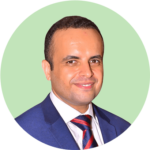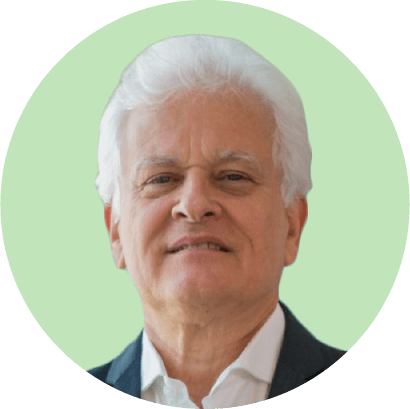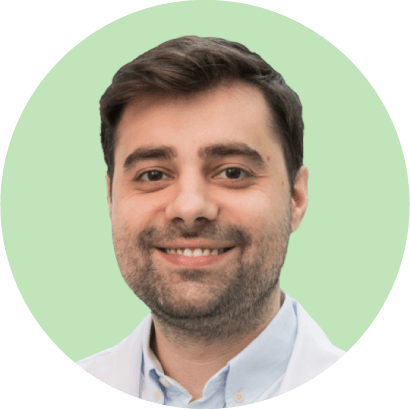






We bring together global teams of patient advocates, healthcare professionals and researchers to define outcomes in our Sets.
These teams, or “Working Groups” will take a systematic approach to reviewing existing measures from a provider, registry and patient perspective, prioritise those which are most important, and propose they be collated together in an ICHOM Set. The methodology for all of our Sets is published in peer-reviewed journals. Watch the video below to find out more.
ICHOM takes a unique approach to defining health outcomes. All of our patient representatives have been treated for, or have cared for someone who has lived with, the condition they are evaluating. We also bring together leading physicians from across the globe who specialize in treating this condition. The ICHOM team facilitates as physicians and patients discuss – and agree upon – the outcomes that matter most.
Physician leaders, patient advocacy members, registry leaders, and patients, help define:
A standardized approach to comparing outcomes across cultures enables patients and caregivers to learn about which providers deliver the best outcomes and to begin to understand why providers in other nations achieve similar outcomes when they use vastly different treatments.

Measuring outcomes that matter most to patients enables a cycle of continuous improvement. By measuring comparable data points and comparing outcomes across providers, organisations can understand what works well and what doesn’t. This drives ever-improving patient outcomes and experiences, generating evidence which leads to payment and regulatory reform.

To measure is to learn, and learning has both a local and an international dimension. Within individual facilities, practices, and provider organizations, clinicians can learn from the outcomes data they gather, improving the lives of their own patients and their colleagues’ patients. At the same time, data derived from standard, internationally-accepted metrics allow care teams across geographies to learn from one another. Measuring and reporting outcomes data allows caregivers from Chicago to Sheffield, from Dublin to Dubai, from Tel Aviv to Tokyo, to evaluate their work using the universal “language” of health outcomes.

Clinicians’ central goal is to help their patients: to cure their illnesses, ease their discomfort, and help them manage their health over time. Doing this more effectively and efficiently requires outcomes data. In this video Dr Barbaro Friden of Sahlgrenska University Hospital, Sweden, explains how larger hospitals can lead the way in collecting data to drive improvement.

More than ever, clinical leadership, governments, and others know that they must deliver high-quality care efficiently. Managing costs without sacrificing quality is possible, but not when stakeholders are blind to the impact of their decisions. Outcomes data removes the blindfold and shines light on the results of procedures, processes, structures, and systems.

Today, hospital rankings are based primarily on basic clinical indicators, such as mortality and infection rates, and on reputation. We believe these indicators don’t capture the full picture. What matters most are the outcomes that patients experience. Hospitals that can demonstrate superior outcomes on certain conditions will attract patients, earn respect, and become leaders among their peers. This lays the foundation for a fairer, more progressive reimbursement model, where Providers are rewarded for improving patients’ lives, rather than delivering volume of care.
This includes patient representatives, leading clinicians and researchers and leads to the publication of the outcomes that matter most to patients. Funds are needed to support the working groups and to drive the process forward.
Our April Webinar is hosted by Tawuniya, Saudi Arabia’s largest and leading private insurer pioneering Value-Based Health Care (VBHC).
24 April 2025
09:00 EDT | 14:00 BST | 15:00 CEST | 17.00 Riyadh time
Presented By: Tawuniya
As healthcare systems shift from fee-for-service to value-based models, payers face the challenge of integrating VBHC principles to achieve better patient outcomes and cost-effective care. Discover how trusted partnerships with providers and mutual risk-sharing agreements can deliver higher quality care while driving value-based reimbursement.
What You Will Learn:
Don’t miss this opportunity to learn from industry leaders and gain practical insights into transforming healthcare financing with VBHC.
Dr Othman Al-Kassabi
CEO of Tawuniya

Dr Mohammad Al-Saeed
CEO of Health Sector Office

Dr Hadi Al-Enazy
Senior Executive Director of Quality, Governance and Transformation

Dr Manal Al-Talal
Population Health Director

Dr Mohamed Kamal
Medical Analytics Director

Dr Husain Halawani
Senior Director Health Governance

Dr Abdulmajeed Binjumayah
Pharmaceutical Rules Director
Seven Years of VBHC in Brazil: Lessons & Future Perspectives
27 March 2025
09:00 EST | 14:00 GMT | 15:00 CET | 11.00 BRASILIA
Presented By: Hospital Moinhos de Vento
Join our Knowledge Partner Hospital Moinhos de Vento (HMV), the pioneer in using the ICHOM framework to elevate patient outcomes in Brazil. Over the past seven years, HMV has implemented PROMs across nine diverse health conditions—from stroke and heart failure to cancers, orthopedic surgeries, neonatal care, and even COVID-19. Experts will share key insights on how these efforts have improved care quality, redesigned care pathways, and addressed challenges along the way.
In this webinar, you will learn:
Speakers

Mohammed Parrini,
Chief Executive Officer at Hospital Moinhos de Vento

Carisi Polanczyk,
Head of the Cardiology Service at Hospital Moinhos de Vento

Luiz Antonio Nasi
Chief Medical Officer at Hospital Moinhos de Vento

Arthur Pille
Attending Neurologist at Hospital Moinhos de Vento

Sheila Martins
Head of Neurology at Hospital Moinhos de Vento
Speakers

Zofia Das-Gupta (Moderator)
Senior Director, Outcomes Implementation & Accreditation
ICHOM

Sumalee Samakkanonthakan, RN, M.N.S. (Adult Nursing)
Manager of Center of Excellence Heart (CoE Heart)
Bangkok Hospital Pattaya
Transform your approach to cardiac surgery care by learning:
Highlights:
